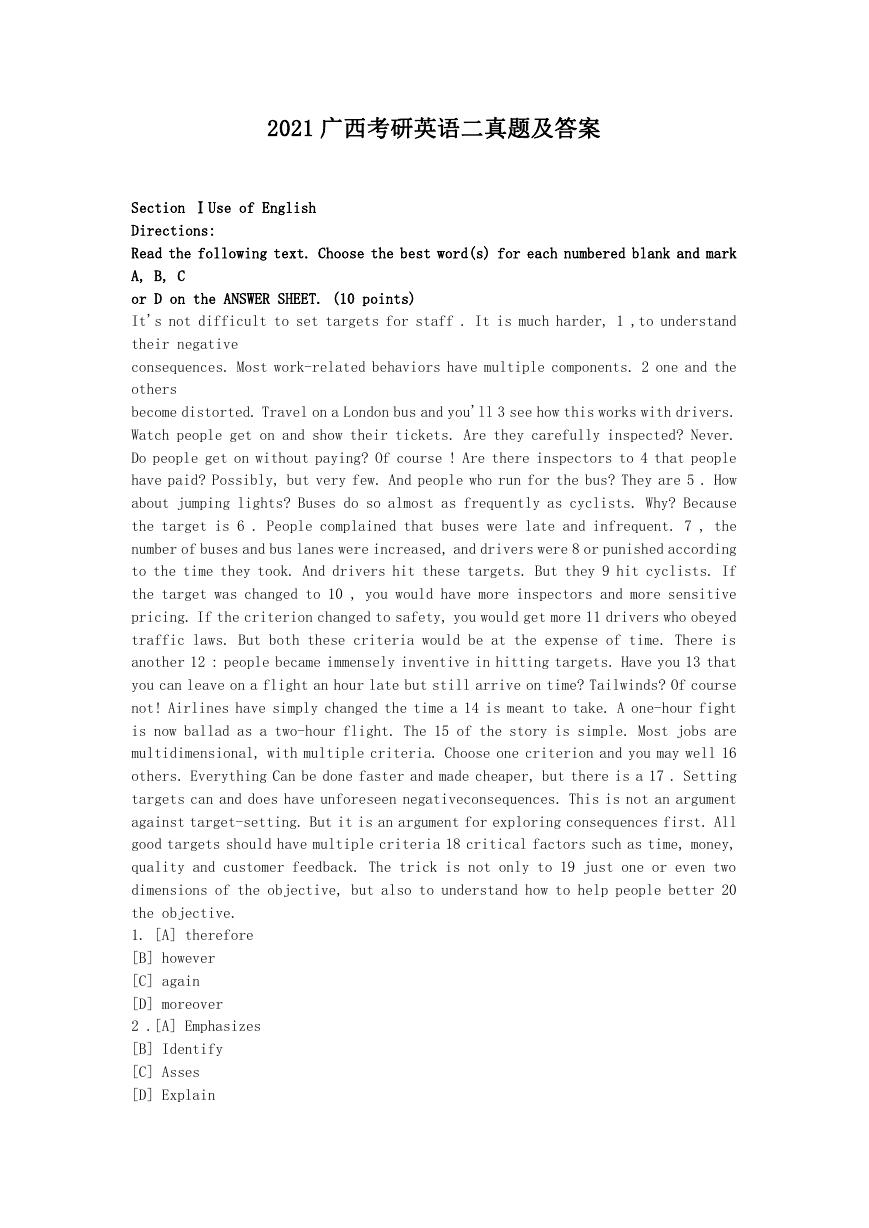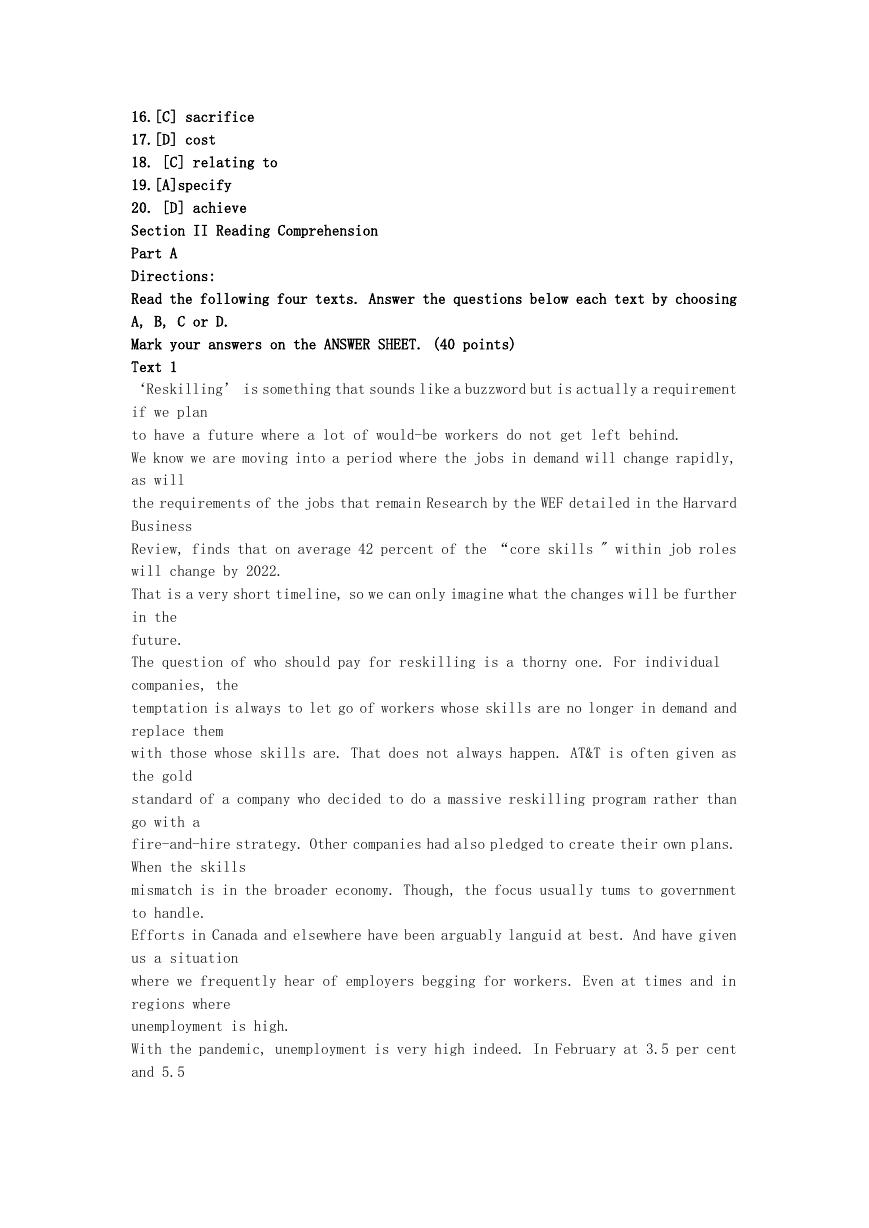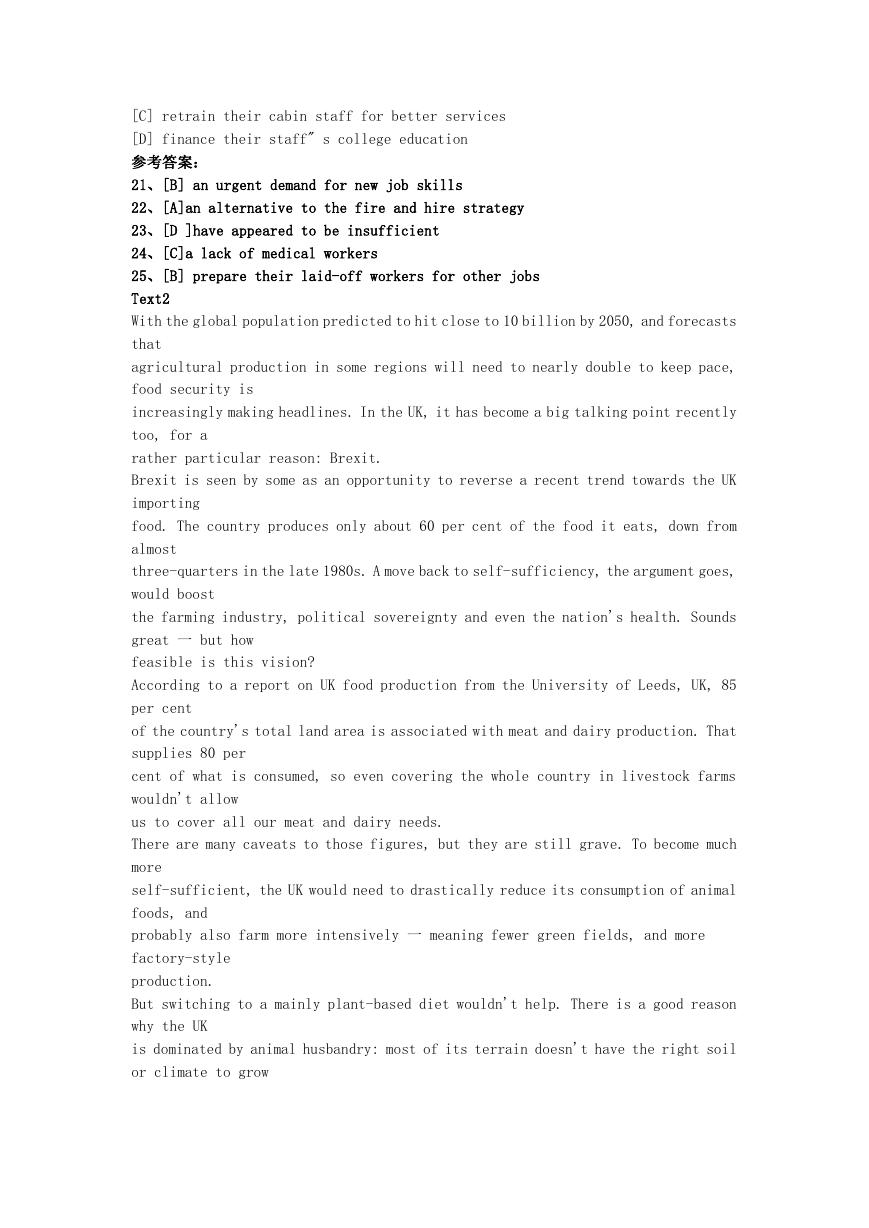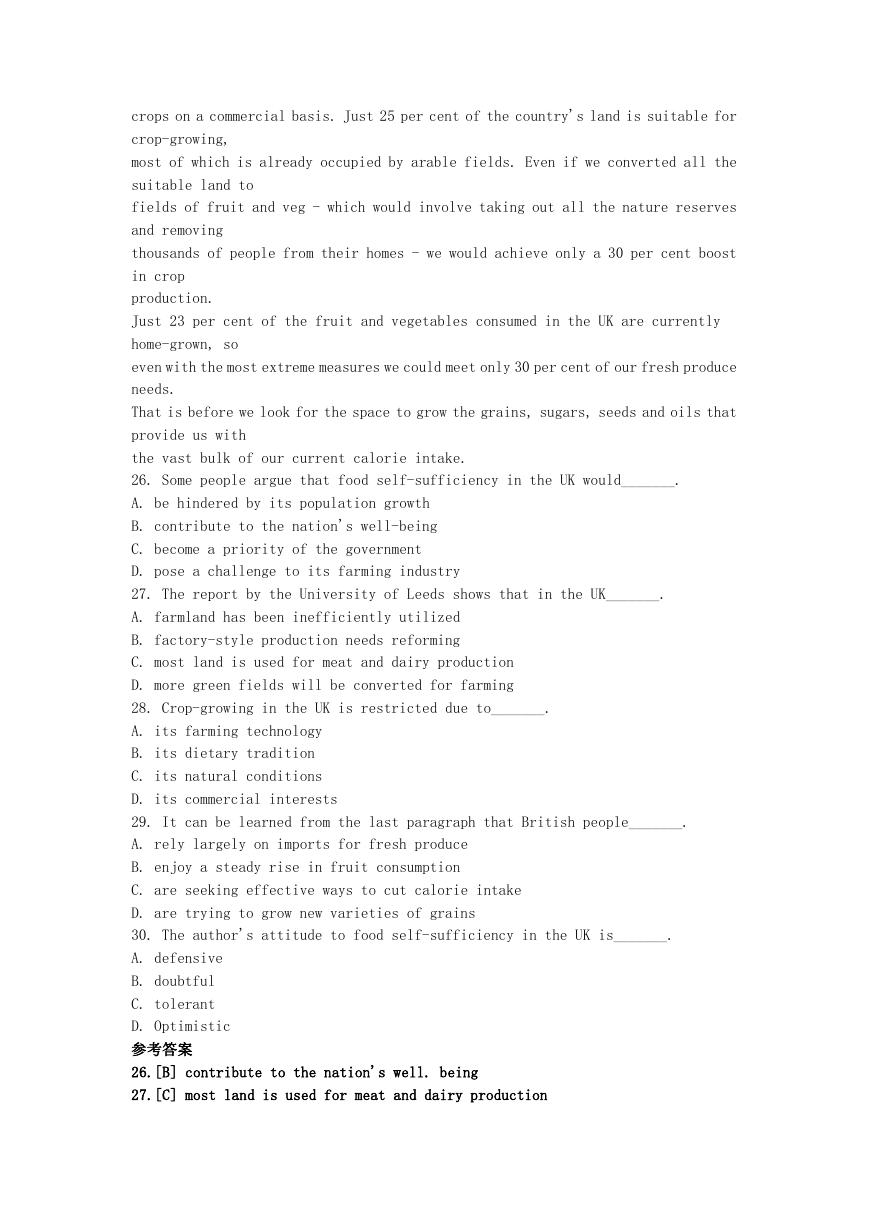2021 广西考研英语二真题及答案
Section ⅠUse of English
Directions:
Read the following text. Choose the best word(s) for each numbered blank and mark
A, B, C
or D on the ANSWER SHEET. (10 points)
It's not difficult to set targets for staff . It is much harder, 1 ,to understand
their negative
consequences. Most work-related behaviors have multiple components. 2 one and the
others
become distorted. Travel on a London bus and you'll 3 see how this works with drivers.
Watch people get on and show their tickets. Are they carefully inspected? Never.
Do people get on without paying? Of course ! Are there inspectors to 4 that people
have paid? Possibly, but very few. And people who run for the bus? They are 5 . How
about jumping lights? Buses do so almost as frequently as cyclists. Why? Because
the target is 6 . People complained that buses were late and infrequent. 7 , the
number of buses and bus lanes were increased, and drivers were 8 or punished according
to the time they took. And drivers hit these targets. But they 9 hit cyclists. If
the target was changed to 10 , you would have more inspectors and more sensitive
pricing. If the criterion changed to safety, you would get more 11 drivers who obeyed
traffic laws. But both these criteria would be at the expense of time. There is
another 12 : people became immensely inventive in hitting targets. Have you 13 that
you can leave on a flight an hour late but still arrive on time? Tailwinds? Of course
not! Airlines have simply changed the time a 14 is meant to take. A one-hour fight
is now ballad as a two-hour flight. The 15 of the story is simple. Most jobs are
multidimensional, with multiple criteria. Choose one criterion and you may well 16
others. Everything Can be done faster and made cheaper, but there is a 17 . Setting
targets can and does have unforeseen negativeconsequences. This is not an argument
against target-setting. But it is an argument for exploring consequences first. All
good targets should have multiple criteria 18 critical factors such as time, money,
quality and customer feedback. The trick is not only to 19 just one or even two
dimensions of the objective, but also to understand how to help people better 20
the objective.
1. [A] therefore
[B] however
[C] again
[D] moreover
2 .[A] Emphasizes
[B] Identify
[C] Asses
[D] Explain
�
3. [A] nearly
[B] curiously
[C] eagerly
[D] quickly
4. [A] claim
[B] prove
[C] check
[D] recall
5. [A] threatened
[B] ignored
[C] mocked
[D] blamed
6. [A] punctuality
[B] hospitality
[C] competition
[D] innovation
7. [A] Yes
[B] So
[C] Besides
[D] Still
8. [A] hired
[B] trained
[C] rewarded
[D] grouped
9. [A] only
[B] rather
[C] once
[D] also
10. [A] comfort
[B]revenue
[C] efficiency
[D] security
11. [A] friendly
[B] quiet
[C] cautious
[D] diligent
12. [A] purpose
[B] problem
[C] prejudice
[D] policy
13. [A] reported
[B] revealed
[C] admitted
[D] noticed
�
14. [A] break
[B] trip
[C] departure
[D] transfer
15. [A] moral
[B] background
[C] style
[D] form
16. [A] interpret
[B] criticize
[C] sacrifice
[D] tolerate
17. [A] task
[B]secret
[C] product
[D] cast
18. [A] leading to
[B] calling for
[C] relating to
[D] accounting for
19. [A] specify
[B] predict
[C] restore
[D] create
20. [A] modify
[B]review
[C] present
[D]achieve
参考答案:
1.[B] however
2.[A] Emphasize
3. [D] quickly
4. [C] check
5. [B] ignored
6. [A] punctuality
7. [B]So
8. [C] rewarded
9. [D] also
10.[B] revenue
11.[C] cautious
12.[B] problem
13.[D] noticed
14. [B] trip
15.[B] background
�
16.[C] sacrifice
17.[D] cost
18. [C] relating to
19.[A]specify
20. [D] achieve
Section II Reading Comprehension
Part A
Directions:
Read the following four texts. Answer the questions below each text by choosing
A, B, C or D.
Mark your answers on the ANSWER SHEET. (40 points)
Text 1
‘Reskilling’ is something that sounds like a buzzword but is actually a requirement
if we plan
to have a future where a lot of would-be workers do not get left behind.
We know we are moving into a period where the jobs in demand will change rapidly,
as will
the requirements of the jobs that remain Research by the WEF detailed in the Harvard
Business
Review, finds that on average 42 percent of the “core skills " within job roles
will change by 2022.
That is a very short timeline, so we can only imagine what the changes will be further
in the
future.
The question of who should pay for reskilling is a thorny one. For individual
companies, the
temptation is always to let go of workers whose skills are no longer in demand and
replace them
with those whose skills are. That does not always happen. AT&T is often given as
the gold
standard of a company who decided to do a massive reskilling program rather than
go with a
fire-and-hire strategy. Other companies had also pledged to create their own plans.
When the skills
mismatch is in the broader economy. Though, the focus usually tums to government
to handle.
Efforts in Canada and elsewhere have been arguably languid at best. And have given
us a situation
where we frequently hear of employers begging for workers. Even at times and in
regions where
unemployment is high.
With the pandemic, unemployment is very high indeed. In February at 3.5 per cent
and 5.5
�
P.C. respectively, unemployment rates in Canada and the United States were at
generational lows
and worker shortages were everywhere. As of May, those rates had spiked up to 13.3
per cent
and 13.7 per cent, and although many worker shortages had disappeared, not all had
done so. In
the medical field, to take an obvious example, the pandemic meant that there were
still clean
shortages of doctors, nurses and other medical personnel.
Of course, it is not like you can take an unemployed waiter and train him to be a
doctor in a
few weeks, no matter who pays for it. But even if you cannot close the gap, maybe
you can close
others and doing so would be to the benefit of all concern. That seems to be the
case in Sweden:
when forced to furlough 90 PC. of their cabin staff. Scandinavian Airline decided
to start up a
short retaining program that reskilled the laid-off workers to support hospital
staff. The effort was
a collective one and involved other companies as well as a Swedish university.
21. Research by the World Economic Forum suggests
.
[A] an increase in full time employment
[B]an urgent demand for new job sills
[C]a steady growth of job opportunities
[D]a controversy re about the“ core skills”
22. AT&T is cited to show .
[A] an alternative to the fire-and-hire strategy
[B] an immediate need for government support
[C] the importance of staff appraisal standards
[D]the characteristics of res- killing programs
23. Eflor1s to resolve the skills mismatch in Canada
[A] have driven up labour costs
[B] have proved to be inconsistent
[C] have met with fierce opposition
[D] have appeared to be insufficient
24. We can learn from Paragraph 3 that there was
[A] a call for policy adjustment
[B] a change in hiring practices
[C] a lack of medical workers
[D]a sign of economic recovery
25. Scandinavian Airlines decided to .
[A] create job vacancies for the unemployed
[B] prepare their laid of workers for other jobs
�
[C] retrain their cabin staff for better services
[D] finance their staff" s college education
参考答案:
21、[B] an urgent demand for new job skills
22、[A]an alternative to the fire and hire strategy
23、[D ]have appeared to be insufficient
24、[C]a lack of medical workers
25、[B] prepare their laid-off workers for other jobs
Text2
With the global population predicted to hit close to 10 billion by 2050, and forecasts
that
agricultural production in some regions will need to nearly double to keep pace,
food security is
increasingly making headlines. In the UK, it has become a big talking point recently
too, for a
rather particular reason: Brexit.
Brexit is seen by some as an opportunity to reverse a recent trend towards the UK
importing
food. The country produces only about 60 per cent of the food it eats, down from
almost
three-quarters in the late 1980s. A move back to self-sufficiency, the argument goes,
would boost
the farming industry, political sovereignty and even the nation's health. Sounds
great 一 but how
feasible is this vision?
According to a report on UK food production from the University of Leeds, UK, 85
per cent
of the country's total land area is associated with meat and dairy production. That
supplies 80 per
cent of what is consumed, so even covering the whole country in livestock farms
wouldn't allow
us to cover all our meat and dairy needs.
There are many caveats to those figures, but they are still grave. To become much
more
self-sufficient, the UK would need to drastically reduce its consumption of animal
foods, and
probably also farm more intensively 一 meaning fewer green fields, and more
factory-style
production.
But switching to a mainly plant-based diet wouldn't help. There is a good reason
why the UK
is dominated by animal husbandry: most of its terrain doesn't have the right soil
or climate to grow
�
crops on a commercial basis. Just 25 per cent of the country's land is suitable for
crop-growing,
most of which is already occupied by arable fields. Even if we converted all the
suitable land to
fields of fruit and veg - which would involve taking out all the nature reserves
and removing
thousands of people from their homes - we would achieve only a 30 per cent boost
in crop
production.
Just 23 per cent of the fruit and vegetables consumed in the UK are currently
home-grown, so
even with the most extreme measures we could meet only 30 per cent of our fresh produce
needs.
That is before we look for the space to grow the grains, sugars, seeds and oils that
provide us with
the vast bulk of our current calorie intake.
26. Some people argue that food self-sufficiency in the UK would_______.
A. be hindered by its population growth
B. contribute to the nation's well-being
C. become a priority of the government
D. pose a challenge to its farming industry
27. The report by the University of Leeds shows that in the UK_______.
A. farmland has been inefficiently utilized
B. factory-style production needs reforming
C. most land is used for meat and dairy production
D. more green fields will be converted for farming
28. Crop-growing in the UK is restricted due to_______.
A. its farming technology
B. its dietary tradition
C. its natural conditions
D. its commercial interests
29. It can be learned from the last paragraph that British people_______.
A. rely largely on imports for fresh produce
B. enjoy a steady rise in fruit consumption
C. are seeking effective ways to cut calorie intake
D. are trying to grow new varieties of grains
30. The author's attitude to food self-sufficiency in the UK is_______.
A. defensive
B. doubtful
C. tolerant
D. Optimistic
参考答案
26.[B] contribute to the nation's well. being
27.[C] most land is used for meat and dairy production
�
28. [C] its natural conditions
29. [A] rely largely on imports for fresh produce
30. [B] doubtful
Text 3
When Microsoft bought task management app Wunderlist and mobile calendar Sunrise
in
2015, it picked two newcomers that were attracting considerable buzz in Silicon
Valley.
Microsoft's own Office dominates the market for "productivity” software, but the
start-ups
represented a new wave of technology designed from the ground up for the smartphone
world.
Both apps, however, were later scrapped after Microsoft said it had used their best
features in
its own products. Their teams of engineers stayed on, making them two of the many
“acqui-hires"
that the biggest companies have used to feed their great hunger for tech talent
To Microsoft's critics, the fates of Wunderlist and Sunrise are examples of a
remorseless
drive by Big Tech to chew up any innovative companies that lie in their path. "They
bought the
seedlings and closed them down," complained Paul Arnold, a partner at San
Francisco-based
Switch Ventures, putting an end to businesses that might one day turn into
competitors. Microsoft
declined to comment.
Like other start-up investors, Mr Arnold's own business often depends on selling
start: ups to
larger tech companies, though he admits to mixed feelings about the result:“I think
these things
are good for me, if I put my selfish hat on. But are they good for the American economy?
I don't
know."
The US Federal Trade Commission says it wants to find the answer to that question.
This
week, it asked the five most valuable US tech companies for information about their
many small
acquisitions over the past decade. Although only a rescarch project at this stage,
the request has
raised the prospect of regulators wading into early-stage tech markets that until
now have been
beyond their reach.
Given their combined market value of more than $5.5 trillion, rifling through such
small
�
















 2023年江西萍乡中考道德与法治真题及答案.doc
2023年江西萍乡中考道德与法治真题及答案.doc 2012年重庆南川中考生物真题及答案.doc
2012年重庆南川中考生物真题及答案.doc 2013年江西师范大学地理学综合及文艺理论基础考研真题.doc
2013年江西师范大学地理学综合及文艺理论基础考研真题.doc 2020年四川甘孜小升初语文真题及答案I卷.doc
2020年四川甘孜小升初语文真题及答案I卷.doc 2020年注册岩土工程师专业基础考试真题及答案.doc
2020年注册岩土工程师专业基础考试真题及答案.doc 2023-2024学年福建省厦门市九年级上学期数学月考试题及答案.doc
2023-2024学年福建省厦门市九年级上学期数学月考试题及答案.doc 2021-2022学年辽宁省沈阳市大东区九年级上学期语文期末试题及答案.doc
2021-2022学年辽宁省沈阳市大东区九年级上学期语文期末试题及答案.doc 2022-2023学年北京东城区初三第一学期物理期末试卷及答案.doc
2022-2023学年北京东城区初三第一学期物理期末试卷及答案.doc 2018上半年江西教师资格初中地理学科知识与教学能力真题及答案.doc
2018上半年江西教师资格初中地理学科知识与教学能力真题及答案.doc 2012年河北国家公务员申论考试真题及答案-省级.doc
2012年河北国家公务员申论考试真题及答案-省级.doc 2020-2021学年江苏省扬州市江都区邵樊片九年级上学期数学第一次质量检测试题及答案.doc
2020-2021学年江苏省扬州市江都区邵樊片九年级上学期数学第一次质量检测试题及答案.doc 2022下半年黑龙江教师资格证中学综合素质真题及答案.doc
2022下半年黑龙江教师资格证中学综合素质真题及答案.doc